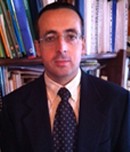

Plenary Lecture
Identification of the Historical Time Periods in Symbolic Music Data

Professor Michele Della Ventura
Department of Technology
Music Academy “Studio Musica”
Treviso, Italy
E-mail: dellaventura.michele@tin.it
Abstract: Despite the various studies on computer-aided musical analysis, there have been relatively few attempts at trying to locate, by means of analysis, a given melody within a certain stylistic period (Baroque, Classical, Romantic or Contemporary).
The main problem is that it is difficult to formalize a compositional style of a certain historical period. This study presents a model of analysis based on the theories of Warren Weaver and Claude Elwood Shannon, able to progressively explore the symbolic level of a melody, identifying the historical period on the basis of the information that it carries. The concept of information has already been used for several years now in linguistic analysis and it has also been applied to musical language. This approach was adopted on the melodic level, omitting concepts like tonality, modulation and moreover rhythm. The efficiency of the model was verified by analyzing a series of melodies by different authors and from different times (trying to range through the different compositional techniques by means of a unique analysis methodology) emphasizing both the strong points and the weak points of the approach.
Brief Biography of the Speaker: Michele Della Ventura defined his professional training, since high school, within the framework of two distinct areas of study: music and mathematics. He embarked on a course of study of the Pianoforte under the guidance of Donato Cuzzato, continuing then with Francesco Bencivenga under the guidance of whom he brilliantly graduated from the “A. Steffani” Conservatory of Music of Castelfranco Veneto in 1993. Concurrently to the music studies he graduated in technology disciplines with the highest honors and distinction, obtaining a scholarship, defending the thesis entitled “Study on the implementation of algorithms for the melodic operators in the symbolic text segmentation and conjoint evaluation of musical entropy”. His dual formation, in Information Technology and music, drives him into carrying out research activities on the relation between Music and Mathematics, attending several seminars on the ”Algebraic Formalization of Musical Structures” held by Moreno Andreatta (researcher at IRCAM in Paris) during which he achieves the algebraic formalization of the “Sechs Kleine Klavierstücke op. 19” by Arnold Schönberg. The development of education-related technologies draw him to focus his attention on the innovations of information technology associated to musical programming languages and to attend a Post-Graduate Master's Degree on E-Learning (E-Learning: methods, techniques and applications) at the University Tor Vergata of Rome, graduating from it with the highest marks with the thesis "Learning and new technologies". His research activity continues within the framework of computer-aided musical analysis, publishing articles and holding national and international conferences and seminars on “Music and new technologies”. From 2000 he has been holding the position of consultant for various national and multinational public and private companies for which he has been developing specific software; he collaborates, as a consultant, to the realization of audio productions exclusively in the field of classical music. He combines his research and IT consultant activity with the position of Music informatics Professor at Music Academies and Conservatories and the position of Musical Technologies Teacher in High Schools specializing in Music.